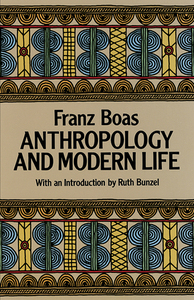Take a photo of a barcode or cover
challenging
informative
medium-paced
This was a reread of one of my old class books. I really enjoyed most of the read (more on that later), and generally find the book to be engaging. If you are at all interested in studying sociology or anthropology this is an essential read. Boaz is a good writer and was a fantastic anthropologist. The dichotomy of his 19th century vernacular paired with what are ostensibly very 20th century ideals can sometimes be a bit dissonant but ultimately makes the read more engaging in my personal opinion. I did occasionally get the sense that he was taking shots at his contemporaries with some of the more scathing lines but unfortunately lack the historical context to understand if there was any good tea there.
The book did have the unfortunate honor of being one of several I was in the middle of right as I was moving, and I did find it exceptionally difficult to jump back in with a chapter and a half left after the dust had settled. I would not recommend any kind of extended pause mid-chapter as a result.
The book did have the unfortunate honor of being one of several I was in the middle of right as I was moving, and I did find it exceptionally difficult to jump back in with a chapter and a half left after the dust had settled. I would not recommend any kind of extended pause mid-chapter as a result.
The context is obviously dated, but his message still resonates. A solid Anthropology book with many intriguing theories/ideas for anyone who know nothing of Anthropology, or have been studying it for years.
Franz Boaz was a German Jewish scholar who came to North America in the 1890s to study Native American tribes and ended up staying in the USA. He became the father of anthropology and taught many of the leading names in the early days of the field such as Ruth Benedict, Ruth Bendt and Margaret Mead. However, Boaz was also a very controversial figure. In the decades leading up to WWII, social scientists were often enamored with what I like to call the evil trinity of modern thought; eugenics, social darwinism and Nietzche's theory of the ubermensch. Social scientists wanted to find the master race and recreate a new and improved humanity long before Hitler took the lead in that department in the 1930s. But Boaz would have none of it. He was not a believer in eugenics, and he did not believe that some human types were inherently superior to others. This bought him ridicule and a reputation as a reactionary in those heady days of the 1920s and 30s. Nevertheless, even though Boaz did not live to see it, he was proven right when mankind saw what an abomination these theories could lead to in Hitler's Germany and its racial policies and death camps. In the end, Boaz and not his crusading students was proven right.
In "Anthropology and Modern Life", Boaz reiterates many of his usual themes. Most specifically he taught that environment influences human types and development far more than genetics does. He discusses research that proves this and shows that members of the same race in different environments are more different than members of different races who happen to be in the same environment. He also discusses the nature of "primitive" versus "Civilized" societies. At a time when most of his contemporaries were still referring to some races as "savages", Boaz warns us that different races develop according to their environments and not according to Western ideas of what constitutes a civilized society. His writing is downright refreshing after reading some of the writings of other early anthropologists, who were far more inclined to judge the peoples that they studied rather than study them objectively.
This book, like others by Boaz, is must reading for any student who is serious about understanding the development of the field of anthropology.
In "Anthropology and Modern Life", Boaz reiterates many of his usual themes. Most specifically he taught that environment influences human types and development far more than genetics does. He discusses research that proves this and shows that members of the same race in different environments are more different than members of different races who happen to be in the same environment. He also discusses the nature of "primitive" versus "Civilized" societies. At a time when most of his contemporaries were still referring to some races as "savages", Boaz warns us that different races develop according to their environments and not according to Western ideas of what constitutes a civilized society. His writing is downright refreshing after reading some of the writings of other early anthropologists, who were far more inclined to judge the peoples that they studied rather than study them objectively.
This book, like others by Boaz, is must reading for any student who is serious about understanding the development of the field of anthropology.
